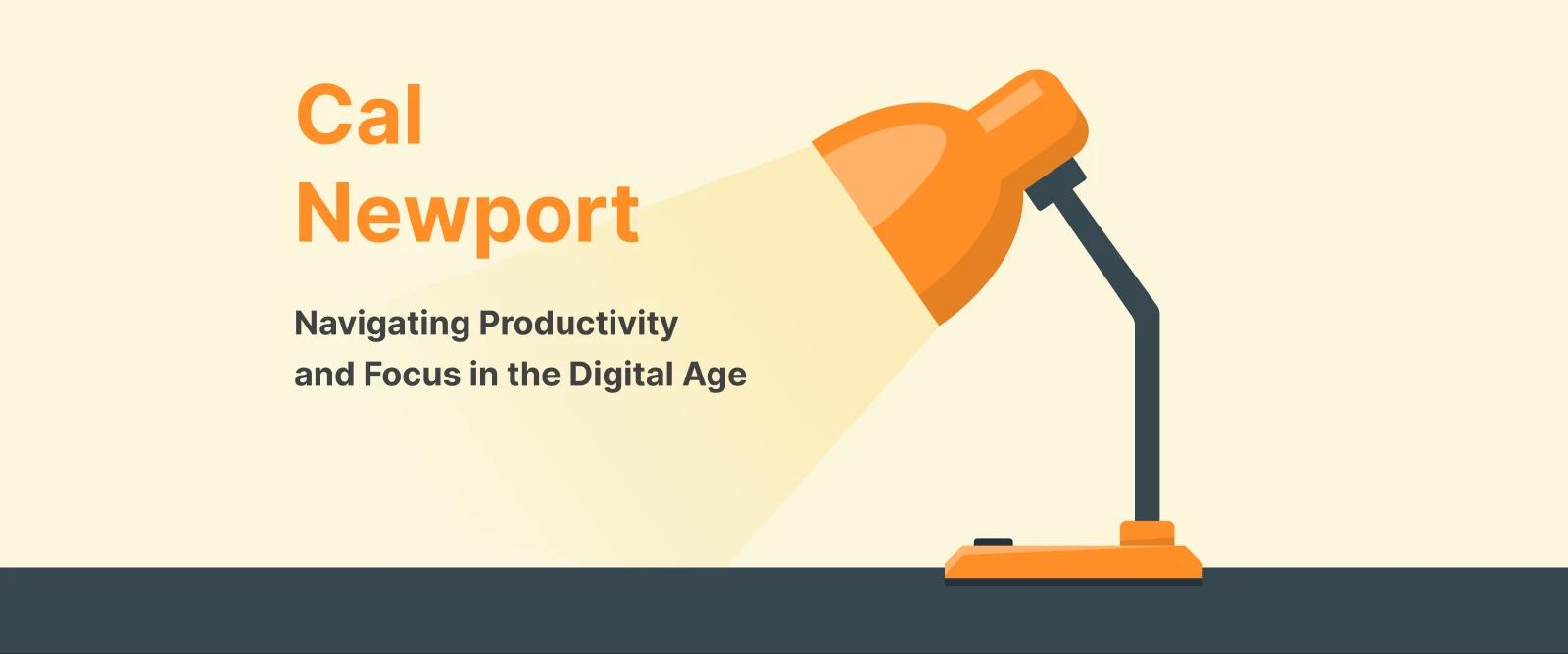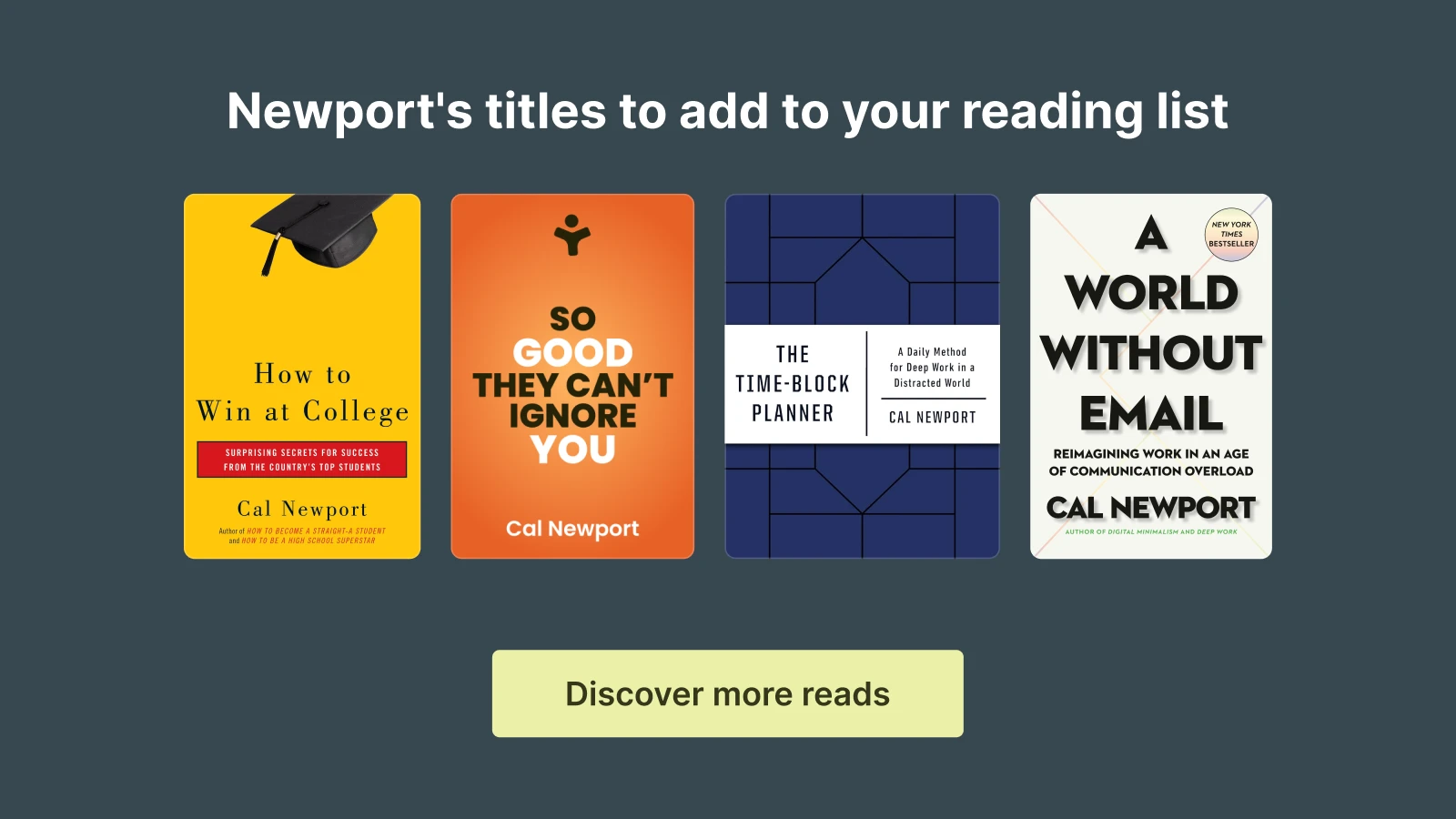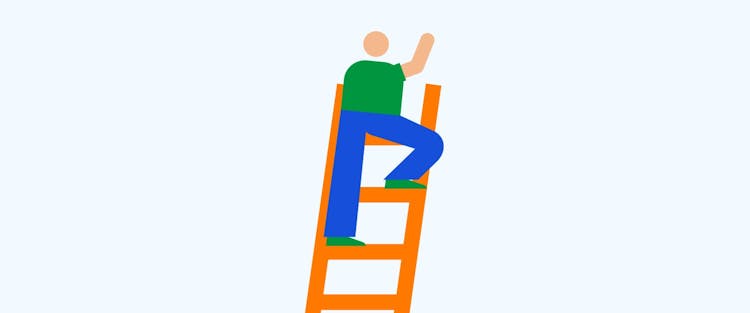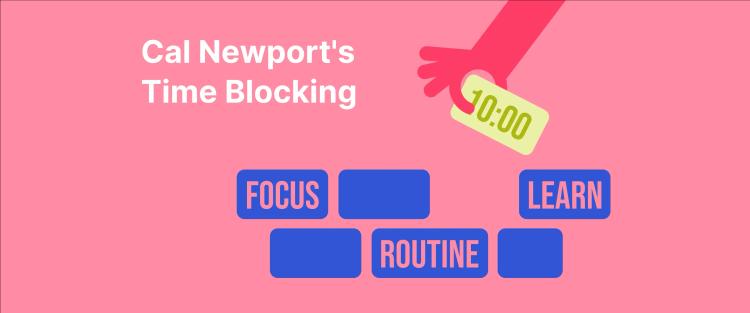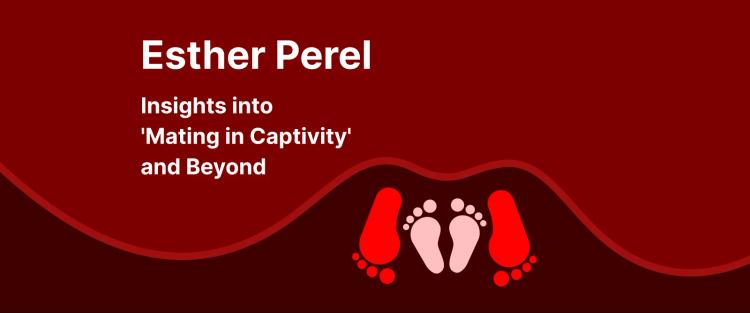Do you feel overwhelmed by the hustle of 21st-century life? Take a deep breath — you're not alone, and there are ways to keep up in moderation. Cal Newport, a bestselling writer and university professor, presents "Deep Work," "Digital Minimalism," and "Slow Productivity" as a force behind genuine progress. Let's explore this secret formula now!
What is the Cal Newport method?
Cal Newport’s productivity method includes:
Scheduling deep, focused work blocks
Reducing or eliminating shallow tasks
Practicing digital minimalism
Saying “no” to non-essential commitments
Building skills over chasing passion
Calvin C. Newport: The architect behind the deep work
Calvin C. Newport's best nickname is "the mastermind behind the best digital age productivity ideas," which we have used since the Internet and social media took over. He ensures that 21st-century workers find everything they need to refine their working style at the intersection of practical minimalism and mental clarity.
Newport's tenure at Georgetown University as an Associate Professor of Computer Science solidified his MIT-style pragmatic touch, which he unified with "simpler, humane language," attracting millions of readers worldwide. His original style makes turning the pages and studying attention management and disruptive triggers easier and enjoyable.
As one of the New York Times' top bestselling authors, Newport presents his global audience with a remarkable portfolio of books that challenge the notion that success today is unattainable without checking off every item on your packed schedule.
In one of his most celebrated reads, 'Deep Work: Rules for Focused Success in a Distracted World' (2016), the author credits deep concentration as a key to finishing complex tasks on time. Meanwhile, his other masterpiece, 'Digital Minimalism,' calls on readers to declutter their digital spaces, setting mind-friendly on and offline priorities.
This original yet relatable style is the secret behind Newport's unfading success. He answers one of the most pressing questions about modern work-life balance: How can you consistently stay productive and distraction-resistant? As an answer, the writer provides a roadmap to navigate through the increasing chaos of today's tech realities.
The core of this roadmap includes a focused task engagement, cautious technology use, and a "deep life" principle, equating economic "energy conversion efficiency" with your non-monetary value. The cornerstone is the "slow productivity system" that helps reduce stress and prevent burnout, today's most notorious threats to our well-being.
Let's take a closer look at Newport's productivity formula
Cal Newport introduced a reimagined version of deep work, digital minimalism, and the slow productivity formula for more efficient time management.
He also suggested monastic (maintaining simplicity), bimodal (contrasting themes for a richer experience), rhythmic (evoking a sense of flow), and journalistic (ensuring accuracy and relevance) tools for adopting deep work into our daily routine.
This new view of our "busy digital lives" has greatly influenced how we assess human limits in meeting all our commitments.
1. Deep work: Train your focus by defying boredom
Focusing well while completing challenging tasks is essential for accurately understanding complex ideas and delivering quality results. In 'Deep Work,' Newport describes this concept as "maintaining focus and getting the job done" without getting distracted.
"Who you are, what you think, feel, and do, what you love — is the sum of what you focus on."
Newport identifies two basic modes of completing your scheduled activities: "deep work," which demands your full attention, and "shallow work," which switches on for less engaging or repeating tasks. He explains that deep work will help you defy distractions, exercise your willpower, and stay creative and competitively fast in learning new skills.
Following Newport's lead, consider these key strategic recommendations to upgrade your deep work mode:
Draft up and follow a routine for a more stable focus.
Defy the feelings of boredom that emerge once you minimize the cheap dopamine you get from triggers like constantly checking your DMs or notifications about a new YouTube video.
Delete social media apps on your smartphone and put time limits on everything that doesn't feed the future you want to live.
Drain "the shallows" or your "less important" projects by ensuring you start and complete complex jobs first.
When you start using a deep work tool, it becomes something special, helping you achieve success in today's knowledge-driven world. Reducing distractions can boost your productivity and keep your mind sharp and flexible.
2. Digital minimalism: Safer and more rewarding technology use
Technology should help us with our jobs and other tasks, not be something we depend on for happiness and fulfillment. This is the ultimate message behind the "digital minimalism" concept in 'Digital Minimalism: Choosing a Focused Life in a Noisy World' (2019).
Everything we use in the digital space should be consistent with our long-term life goals as an alternative to instant gratification. Newport shares three simple hacks for using technology with a minimalist mindset to ensure that your habits align with what matters the most to you:
Clean up your digital space: Close unnecessary browser tabs and unsubscribe from services you don't use to save time, money, and attention.
Use technology in a way that reflects your values. This will make you more self-reliant, confident, and efficient.
Develop an intentional mindset: Consciously monitor your daily use of digital resources, ensuring their positive influence on productivity, health, and relationships.
Digital minimalism encourages meaningful experiences in real life and allows us to function in no-distraction mode, engaging in deep work for longer. Newport juxtaposes the minimalist approach and its "digital declutter" core with a "maximalist mindset."
The maximalist mindset quickly adopts new tech without considering its effects on the brain. Social media companies are known to design their platforms to hook users in and ensure they come back often, affecting their mental health and self-control function. By staying aware of all this, you will make safer choices and lead a nurturing digital life.
3. Slow productivity: Finding success that lasts
In 2024, Cal Newport published his new book, 'Slow Productivity: The Lost Art of Accomplishment Without Burnout.' The professor encourages readers to achieve meaningful goals without exhausting themselves. He focuses on doing high-quality work instead of just getting it done, promoting sustainable productivity.
His philosophy aims to make knowledge work more fulfilling by following three main principles:
Streamline your to-do list: Focus on key tasks to avoid overcommitting and make a real impact.
Maintain a healthy work routine: Find a balance between being productive, keeping your energy up, and taking breaks when needed.
Aim for top-notch results: Keep improving your work quality and maintaining high standards to build your sense of achievement.
Newport criticizes today's focus on always being busy. He argues that we should not confuse constant activity with actual productivity. Instead, he suggests focusing on fewer tasks to give each one the attention it needs, setting a work rhythm friendly to our body and mind.
"There exists a myth that it's hard to say no, whether to someone else or to your own ambition. The reality is that saying no isn't so bad if you have hard evidence that it's the only reasonable answer."
Newport discusses the problems caused by constant connectivity and the pressure for immediate communication. This can lead to stress and low energy. He suggests a "slow productivity" approach, which helps people focus on what is truly important and balance between their well-being and work output.
Cal Newport in media: An advocate of a value-driven work ethic
Newport reaches his audience through straight-to-the-point content, life-hack reads, and interactive media. His ideas on AI and other innovations, shared through various outlets, reflect the main points of 'Deep Work' and 'Digital Minimalism.' He criticizes the abusive side of digital culture and encourages mindful interactions with technology.
Staying in touch with his followers helped the author to build a lively community of readers, strengthening his appeal in different circles, especially among the "knowledge workers."
In 2020, he started the Deep Questions Podcast, answering questions and providing practical strategies to improve functional focus. For more information on the podcast and the author's media, visit Calnewport.com and TheDeepLife.com.
Since 2021, Newport has written for The New Yorker. His articles cover trending tech-world topics like ChatGPT and how society reacts to new technologies. The author follows a structured writing process: drafting an outline, doing thorough research, and setting specific deep-focus writing times.
He aims to meet Tuesday's deadline for submitting the publication scheduled for the following Monday. Such a discipline is testimony to Newport's dedication to quality and the deep work method he advocates.
The author's in private: Embracing deep life without socials
Cal Newport practices what he preaches in terms of technology and productivity. He completely avoids social media because he believes that a computer scientist and bestselling author can succeed without it. He reminds readers that socials often trigger anxiety and discontent, so he is insistent on using them responsibly.
Objectively, he is absolutely right: social media detoxes usually improve self-reflection, increase privacy, and reduce seeking out online approval.
The writer incorporates his deep work philosophy into his daily life through "fixed-schedule productivity." He sets specific work hours and always drafts a plan. Each week, he checks his scheduled activities to see if they match his values. His "Personal Code of Conduct" lists clear rules for what he will always do and what he will never do.
Newport lives with his wife, Julie, and three sons, Max, Asa, and Joshua, in Takoma Park, Maryland. He balances his work and family life by practicing sustainable productivity and intentional living. His opposition to social media strengthens his advocacy for digital minimalism, highlighting its usable and serviceable features.
Is there a reason for concern over Cal Newport's legacy?
It depends. Cal Newport's books have changed how we think about productivity in today's workplace. He criticizes "hustle culture," which equates being busy with being productive, and offers a new view on productivity in different fields.
Newport supports creating workspaces that help people focus deeply. This convinced many companies to redesign their offices by adding quiet rooms and distraction-free zones. Many people admire Newport's ideas for his contribution to corporate norms of life and time-management policies.
However, some argue that his advice mainly helps employees with flexible hours. Critics are concerned that his suggestions might appear privileged, so not everyone will relate to them, particularly those in subordinate positions.
Regardless of opinions, Newport's emphasis on managing attention inspires meaningful conversations about digital-age productivity that can make a positive difference. His concepts promote a quality shift toward discovering personal fulfillment and encouraging a healthier work-life balance.
Stop chasing passion, start building skills: More of Newport for your reading list
Does your inbox or DMs make your "parasocial relationships" dominate over real-life connections? In his books, Newport shares strategies to boost your productivity and transform both your work and school life. He cuts out the fluff and gives you straightforward, proven techniques to improve your focus and self-control.
'How to Win at College: Simple Rules for Success from Star Students' (2005) offers students a clear, pragmatic guide to running and finishing their academic race well. Newport provides actionable strategies that work.
"Start small and start immediately."
2 'So Good They Can't Ignore You: Why Skills Trump Passion in the Quest for Work You Love' (2012) challenges the idea that careers should be based solely on passion. Instead, Newport supports a stance that building a functional skillset is the key to a satisfying life where work isn't a burden or a mere means of survival.
"Craftsman mindset focuses on what you can offer the world, the passion mindset focuses instead on what the world can offer you."
3 'The Time-Block Planner: A Daily Method for Deep Work in a Distracted World' (2020) teaches you how to get things done by organizing your time with a method called time blocking. It provides templates to help you focus on your tasks and stay disciplined in reaching your goals.
4 'A World Without Email: Find Focus and Transform the Way You Work Forever' (2021) addresses communication overload or when the demands of your presence start threatening your health. Newport offers ways to increase focus for those aspiring to apply all the secrets of success in the digital era.
"A better strategy for shifting other's expectations about your work is to consistently deliver what you promise instead of consistently explaining how you're working."
Slow down and embrace deep work with Headway
Cal Newport suggests practical strategies for growing productivity and taking advantage of the digital revolution. The writer emphasizes the importance of staying focused, being intentional, and developing sustainable work habits. He advises tools to increase your attention span and workability while sticking to a well-planned routine.
To continue your progress in this direction, explore career development and change with Headway. Our curated reading lists, including subscribers' favorite "Top 208 Productivity Books for Optimum Productivity" and "248 Essential Books on Emotional Intelligence for Enhancing Skills," will help you master actionable strategies for consistent progress.
Our offers also include popular reads on keeping up with the latest tech updates that developers release each year. Download Headway now to start your journey to a more focused and productive version of yourself.
FAQ
Does Cal Newport have a PhD?
Cal Newport holds a PhD in computer science from the Massachusetts Institute of Technology.
How many books has Cal Newport sold?
Cal Newport's books are indeed a huge hit — over 2 million copies sold globally and translated into 40+ languages.
What is Cal Newport’s best book?
Cal Newport’s best-known and most influential book is Deep Work: Rules for Focused Success in a Distracted World (2016). It introduced his core philosophy of eliminating distractions to achieve high-quality, focused work. Many readers consider Deep Work a foundational guide for knowledge workers, students, and creatives seeking to improve performance in the digital age.
What is Cal Newport’s best work?
Deep Work is widely considered Cal Newport’s signature contribution to the productivity space, but his “best work” depends on your needs. If you're struggling with distraction, Digital Minimalism may resonate more. If you're dealing with burnout, his newest release, Slow Productivity, offers strategies for long-term, sustainable success. All three are highly regarded in the productivity and time-management communities.
Is So Good They Can’t Ignore You worth reading?
Yes, So Good They Can’t Ignore You (2012) is a highly recommended read, especially for those seeking career clarity. In it, Newport challenges the popular idea that “follow your passion” leads to success. Instead, he argues that building valuable skills through focused effort is the real path to meaningful work. It’s a practical, research-backed book for professionals, students, and career changers alike.
Should I read Deep Work or Digital Minimalism first?
Start with Digital Minimalism if you feel overwhelmed by social media or digital noise — it helps you reset your relationship with technology. Begin with Deep Work if you’re already reducing distractions and want to sharpen your ability to focus and produce high-value work. Both books complement each other, and reading them in either order will provide lasting benefits.
Does Cal Newport have Instagram?
No, Cal Newport does not use Instagram or any social media platforms. He believes social media contributes to distraction, anxiety, and shallow thinking. His stance reflects the philosophy behind his book Digital Minimalism, which encourages mindful and intentional technology use.
What is Cal Newport known for?
Cal Newport is known for his groundbreaking work on focus, productivity, and digital wellness. He coined the term deep work to describe focused, distraction-free concentration and popularized digital minimalism as a lifestyle choice. His books offer practical frameworks to help people succeed in an increasingly noisy and fast-paced digital world.

